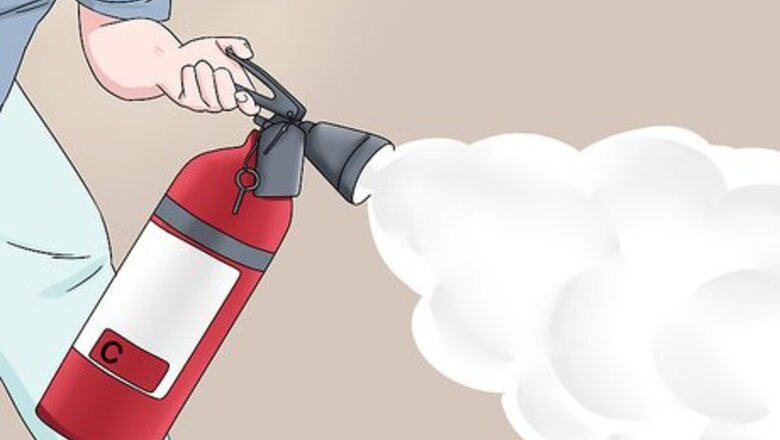
views
Extinguishing an Electrical Fire
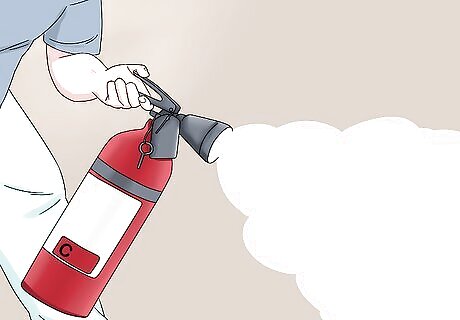
Use a C-rated fire extinguisher to put out the fire. If there is a C-rated (or ABC-rated) fire extinguisher nearby, spray it on the fire. Professional firefighter David Decker explains that you can only use a B- or A-rated extinguisher if you are 100% certain the power is off. A- and B-rated extinguishers are designed for normal fires and flammable material fires, respectively. Unfortunately, they rely on conductive materials to put out fires. That means that if the power is on, A- and B-rated extinguishers may make the fire worse or shock you. The letter rating for the extinguisher will be prominently displayed on the label.
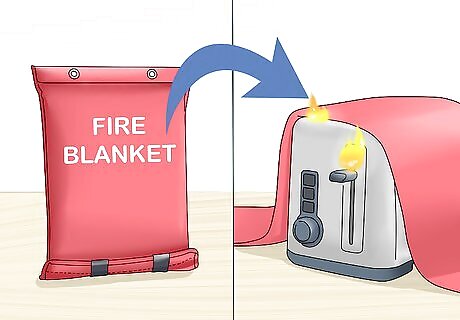
Smother the fire with a blanket if you don't have an extinguisher. If you have a fire blanket, use that. Otherwise, any thick blanket will work. Simply throw the blanket on top of the fire to cover it completely. Alternatively, Decker explains that you could cover the item with a large pan or pot if it’ll fit on top of the flame. Use multiple blankets if necessary. Any heavy fabric will work. Duvets, towels, and drop cloths will all accomplish the same goal. By covering a small fire you are eliminating much of the oxygen the fire needs to keep going.
Douse a small fire with baking soda to put it out. If you don’t have a thick blanket or a fire extinguisher, covering the flame with baking soda can extinguish it. Pour an entire container over the fire all at once. Use a liberal amount of baking soda to ensure you completely smother the fire. Baking soda is only an option for smaller fires. When baking soda is exposed to heat, it releases carbon dioxide. That carbon dioxide will choke any existing fire and put it out.
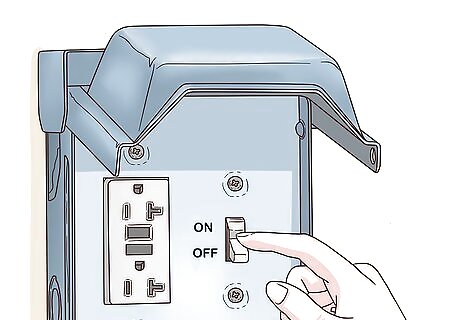
Use water only if you disconnect the power first. Decker emphasizes how important it is to unplug an appliance or flip your home’s breaker if there’s an electrical fire. This is the only way you can safely use water on an electrical fire. Disconnecting the power will eliminate the risk of electrocution and keep water from spreading the fire. If you put water on an electrical fire, you may be putting your life in danger. Water is highly conductive, which means you’re highly likely to be electrocuted if the power isn’t off.

Evacuate if the fire grows quickly and you can’t put it out. If you begin to feel unsafe, an exit becomes blocked, you get burned, you start to breathe in smoke, or your fire-fighting techniques are not working, abandon your efforts and get out of the building. Your safety is more important than your belongings or preserving the building. Close doors behind you as you leave. This will help keep the fire as contained as possible.
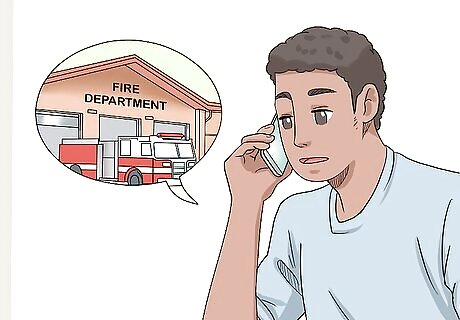
Call emergency services if you can’t fight it or need to evacuate. If you need to flee or you’re struggling to fight the fire on your own, contact the fire department. Even after you call you may be able to get it out yourself, but it is better to be safe than sorry when it comes to a fire. In general, firefighters will be better equipped to fight a fire that has live electricity in the mix than you will be. Tell the person you talk to that you are dealing with an electrical fire so that the firefighters know what they are getting into.
Can you use water to put out an electrical fire?
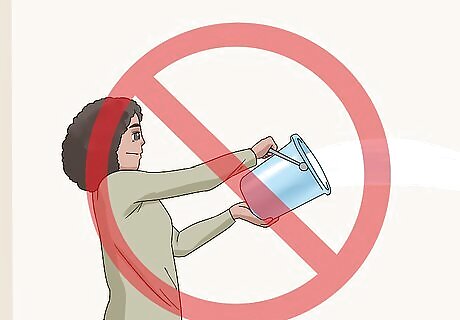
If the power is still on, you cannot use water on an electrical fire. If you cannot turn off the electricity and the area that is on fire is still energized, do not pour water on the flames. Water will conduct the electricity that caused the fire, creating an electrocution hazard in addition to the fire hazard. If you are unsure whether a fire has been caused by live electricity or something else, err on the side of caution and don't use water.
How to Use a Fire Extinguisher
Pull the silver safety pin and move the nozzle back and forth. To properly operate a fire extinguisher, use the PASS technique: P - PULL the silver safety pin on the handle of the extinguisher. A - AIM the hose and nozzle of the extinguisher at the fire. S - SQUEEZE the handle of the fire extinguisher slowly. S - SWEEP from left to right, making sure to get every part of the fire.
Preventing Electrical Fires
Investigate any burning smells. Before an electrical fire breaks out, the wiring typically heats up hot enough to begin burning the insulation. This usually smells like melting plastic (often with a slight fishy aroma). If you ever come home to find an odd smell, investigate the source of the odor to prevent electrical fires from breaking out. If the source of the odor appears to be coming from inside of a wall or ceiling, shut the power to your home off immediately and contact 911. You probably have an electrical fire developing inside your walls.
Replace old or inconsistent appliances. If you’ve got a toaster, microwave, oven, or fridge that’s on the older side, keep an eye on it and replace it at the first sign of trouble. Outdated or failing appliances are the #1 cause of electrical fires, so don’t hesitate to update your appliances when they’re reaching their end of life. Appliances last, on average, around 13 years. If it’s been over 15 years since you went appliance shopping, keep it on your radar.
Work exclusively with licensed electricians. Electrical work is never a DIY job. If you ever need to do electrical work, hire a professional electrician. Poor wiring work and outlets that aren’t wired correctly are the second-most common cause of electrical wires, so always work with someone reputable when setting up outlets or having electrical work done. You can always hire an electrician to inspect the wiring of your home and let you know if there are any potential issues.




















Comments
0 comment